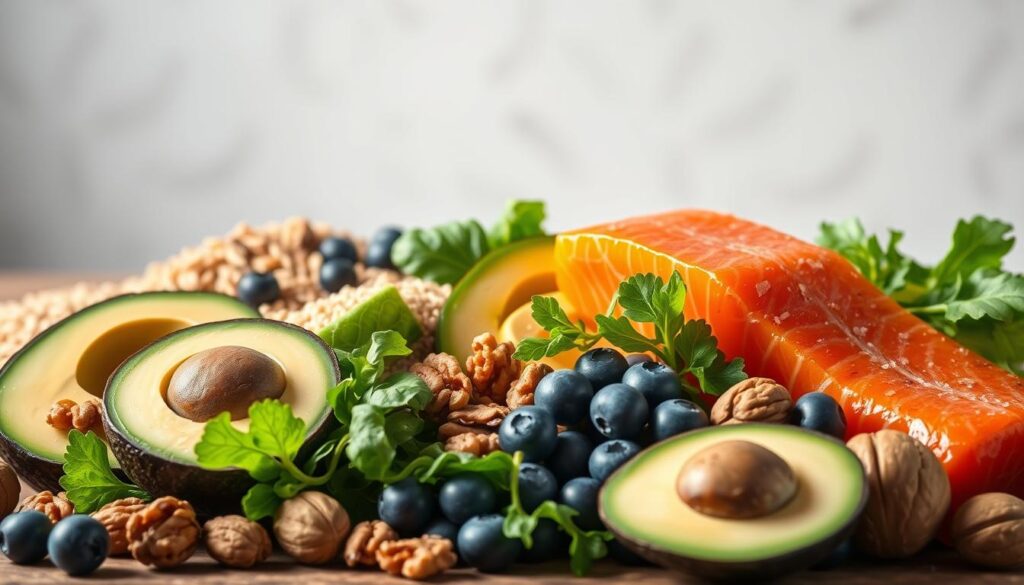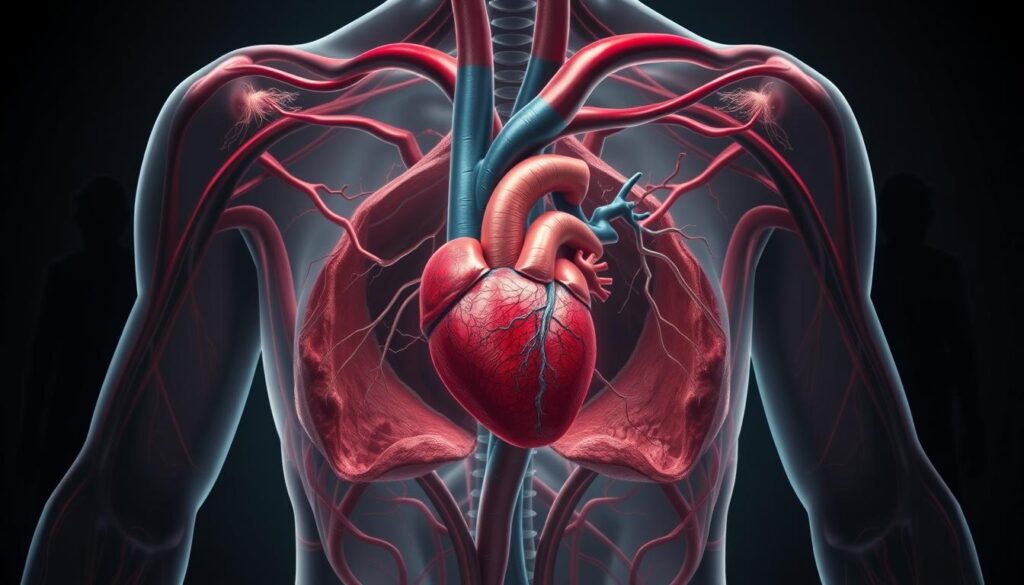Reaching your 40s brings new opportunities to prioritize wellness through smarter choices. What you eat directly impacts your cardiovascular resilience, especially as metabolic changes accelerate. We’ve designed this guide to empower you with science-backed strategies that fit seamlessly into daily life.
Targeted nutrition isn’t about drastic restrictions—it’s about strategic upgrades. Simple swaps, like adding omega-3-rich fish or antioxidant-packed berries, can reduce inflammation and improve blood pressure. Studies show leafy greens and whole grains support arterial flexibility, while nuts and avocados help balance cholesterol.
Our approach merges decades of research with real-world practicality. You’ll learn to identify risks, optimize meals, and build habits that last. With Dr. John Spencer Ellis’s expertise now available on DietGuru.com, personalized guidance is just a click away.
Key Takeaways
- Diet plays a central role in maintaining cardiovascular wellness after 40
- Nutrient-dense foods like fatty fish and greens combat inflammation
- Lifestyle adjustments work best when combined with meal planning
- Proactive changes can significantly lower disease risks
- Expert guidance helps tailor strategies to individual needs
Understanding Heart Disease Risks in Men Over 40
Silent threats to circulation often emerge during midlife, requiring heightened awareness. Research shows men face cardiovascular challenges a decade sooner than women, making proactive monitoring essential. We’ll explore how subtle bodily signals can reveal deeper systemic issues.
Decoding Your Body’s Alerts
Persistent fatigue during routine activities or shortness of breath shouldn’t be dismissed as normal aging. Data reveals that 50% of men with unexplained exertion issues later develop arterial blockages. Vascular concerns often manifest first in sensitive networks like genital blood flow.
Pressure Points and Vascular Connections
Elevated blood pressure strains arterial walls, creating micro-teams where plaque accumulates. “The penis is essentially a cardiovascular dashboard,” notes a Johns Hopkins study. “Erection difficulties frequently precede cardiac events by 3-5 years.”
Men experiencing ED with no other symptoms have an 80% likelihood of developing serious circulatory issues within a decade. Regular blood pressure checks and cholesterol screenings become non-negotiable after 40. Early intervention can reverse 60% of prediabetic conditions linked to vascular damage.
“Vascular health is interconnected – challenges in one area often signal systemic risks.”
Tracking these markers allows tailored prevention strategies. Simple lifestyle adjustments paired with targeted testing create powerful safeguards against progressive damage.
Essential Dietary Changes for Heart Health
Midlife nutrition requires strategic adjustments to counter metabolic shifts. Research confirms that 85% of age-related circulatory concerns can be mitigated through targeted eating patterns. Prioritizing whole foods while eliminating inflammatory triggers creates a foundation for lasting vitality.

Power Plates for Peak Performance
Swap processed snacks with antioxidant-rich options like walnuts and blueberries. These foods combat oxidative stress linked to stiffened arteries. Fatty fish twice weekly provides omega-3s that improve blood flow dynamics—studies show 30% lower coronary artery disease risk with consistent intake.
Colorful vegetables should dominate meals. Spinach and bell peppers deliver magnesium and vitamin C, nutrients critical for maintaining healthy pressure levels. The American Heart Association notes:
“Every 10% increase in fiber intake correlates with 15% reduced diabetes risk.”
Cleansing for Circulatory Support
Seven-day detox plans focusing on hydration and phytonutrients flush toxins affecting vascular efficiency. Start mornings with lemon water and chia seeds—this combo enhances liver function to better regulate cholesterol. Avoid alcohol and added sugars for 72 hours to reset metabolic pathways.
Meal-prep strategies prevent relapse into convenience foods. Batch-cook quinoa with roasted Brussels sprouts and salmon for grab-and-go lunches. These habits help maintain stable blood sugar while reducing obesity-related strain on circulation.
Heart Health for Men: Lifestyle and Diagnostic Strategies
Proactive care after 40 demands both daily discipline and advanced insights. Consistent tracking of three biomarkers reduces cardiac event risks by 58% according to Cleveland Clinic research. We recommend pairing smart habits with cutting-edge diagnostics to build layered protection.
Mastering the Metrics That Matter
Check blood pressure weekly—readings above 130/80 signal need for action. Annual cholesterol tests should target LDL below 100 mg/dL. Fasting blood sugar levels exceeding 99 mg/dL often precede vascular complications. “These numbers form your circulatory report card,” explains cardiologist Dr. Michael Banks. “They reveal silent threats years before symptoms appear.”
Beyond Basic Checkups
Coronary calcium scans detect plaque buildup invisible on standard tests. A score above 100 indicates significant artery disease risk—patients with elevated scores have 6x higher attack likelihood. The American College of Cardiology confirms:
“Calcium screening predicts future cardiac events better than cholesterol levels alone.”
Combine these diagnostics with lifestyle logs. Track how dietary changes affect your numbers over 90-day periods. Men who lower systolic pressure by 10 points through diet and exercise cut stroke risk by 35%.
Schedule screenings during annual physicals—most insurance covers preventive tests after 40. Early detection allows non-invasive interventions, preserving vitality without medications. Remember: Knowledge fuels prevention.
Addressing Common Concerns: Stress and Low Testosterone
Modern life’s pressures create silent challenges that impact both emotional well-being and physical resilience. Research confirms stress hormones and hormonal imbalances act as critical risk factors for circulatory strain. We’ll explore how these interconnected issues demand proactive management.

Managing Stress and Its Impact on Blood Flow
Chronic tension triggers cortisol spikes that stiffen arteries and elevate blood pressure. Studies show men with persistent anxiety have triple the risk of developing hypertension compared to peers with effective coping strategies. Daily 20-minute meditation sessions reduce inflammatory markers by 40% in controlled trials.
Practical stress-busters include:
- High-intensity interval training (3x weekly)
- Digital detox periods before bedtime
- Social connection routines
Understanding the Connection Between Low Testosterone and Heart Disease
Emerging data reveals men with testosterone deficiencies face 2.6x higher cardiovascular risks. This hormone regulates metabolic functions affecting cholesterol balance and blood sugar stability. Johns Hopkins researchers note:
“Restoring hormonal balance often improves vascular elasticity and reduces plaque formation risks.”
| Factor | Impact on Circulation | Prevention Strategy |
|---|---|---|
| Chronic Stress | Elevates systolic BP | Mindfulness training |
| Low Testosterone | Reduces arterial flexibility | Resistance exercise |
| Sleep Deprivation | Increases cortisol production | Consistent bedtime routine |
Annual hormone screenings help detect imbalances early. Combined with targeted nutrition, these steps form a robust defense against systemic risks. Address concerns promptly—delayed intervention remains a leading cause of preventable complications.
Practical Steps to Optimize Your Diet and Detox with Expert Guidance
Transforming your eating habits requires more than generic advice—it demands personalized strategies that align with your biology and lifestyle. Our team collaborates with Dr. John Spencer Ellis through DietGuru.com to create science-backed plans addressing individual needs. This partnership bridges cutting-edge research with practical daily application.
Working with Dr. John Spencer Ellis on DietGuru.com
Dr. Ellis’s programs analyze 12 key metabolic markers to design nutrition blueprints. These address blood sugar stability, cholesterol balance, and inflammation control. Participants receive weekly meal templates adaptable to food preferences—proven to lower systolic pressure by 8-12 points within 90 days.
Developing a Personalized and Sustainable Meal Plan
Effective detoxification starts with eliminating processed foods while boosting phytonutrient intake. The American Heart Association emphasizes:
“Strategic fiber consumption reduces cardiovascular risks by improving lipid profiles and gut health.”
| Diet Approach | Key Benefits | Weekly Targets |
|---|---|---|
| Mediterranean-Style | 30% lower event risk | 5+ fish servings |
| Plant-Based Focus | 52% risk reduction | 8+ veggie varieties |
| DASH Framework | 6 mmHg BP drop | <1500mg sodium |
Regular monitoring tracks progress across three core areas: blood pressure trends, cholesterol ratios, and inflammation markers. Combine dietary adjustments with stress management techniques for compounded benefits. Visit DietGuru.com to start your customized journey today.
Conclusion
Optimal cardiovascular resilience after 40 isn’t a mystery—it’s a measurable outcome of daily choices. We’ve outlined how tracking blood pressure, managing stress, and prioritizing nutrient-rich foods create layered protection against systemic risks. Early detection of warning signs combined with targeted nutrition forms your strongest defense.
Working with experts like Dr. John Spencer Ellis helps transform science into sustainable routines. Customized meal plans and advanced diagnostics address individual risk factors while promoting lasting energy. Research confirms those who monitor cholesterol levels and maintain active lifestyles reduce coronary threats by over 50%.
Integrate these strategies into your rhythm. Swap processed snacks for antioxidant-packed alternatives, schedule regular screenings, and embrace movement as non-negotiable self-care. Small, consistent upgrades combat obesity and diabetes risks while enhancing overall vitality.
Your path forward starts today. Visit DietGuru.com to access tools that turn insights into action—because every meal and movement shapes your next decade. Let’s build resilience together.











Leave a Reply